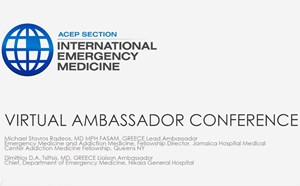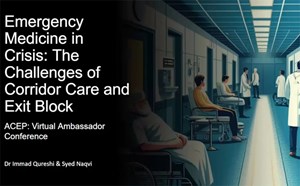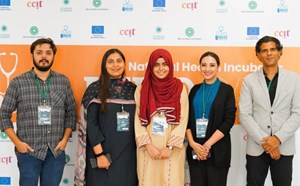Successes and Challenges in Qatar Emergency Medicine
Watch this International EM Section Virtual Ambassador Conference webinar covering emergency medicine in Qatar. Dr. Tahir Shahzad presents.
Read the Full Transcript
- Hello to everyone. I'm Dr. Tahir. I'm one of the emergency physicians working in Qatar. Next slide, please. Okay, so Qatar, just to let you know, it's a small northeastern coast nation just around Arabian Peninsula, and we are very honored to host international events, big international events like FIFA World Cup 2022. Qatar has evolved in the past, I would say 20-30 years exponentially, playing its critical role in providing state-of-the-art healthcare services, not only to the people of Qatar but to the whole area, to the whole Middle East part. Next slide, please. Okay, so I'm working in Hamad Medical Corporation, and that's the major site in Qatar. So that's the common setup and that is the main site for training. We have more than six hospitals I can see in the slide mentioned with the names, we have an ACGME-I career training program, and I'm the product of that program and I'm very proud of it. We have four years training program. We are affiliated with ACGME since 2013 and now we have a dual board, which is recently introduced. So we have our own board now, which reflects consistency to build emergency medicine from its court. So now we have Arab Board on. On the top of it, we have Qatar Board as well, which is like only introduced two years ago and I'm the first graduate from the Qatar Board of Emergency Medicine. So I personally be proud of it and I can totally say that I have gone through it and it's just an experience that you can see is nothing but less compatible to retrain at any part of the world. Next slide, please. So these are the major events that you can say have occurred in the past 7-10 years. So, we have hosted FIFA World Cup 2022. That was a major event. In terms of our evolution in emergency medicine, we have learned a lot. I think we have taught a lot as also. We have Hamad International Airport, which is a international gateway that connects world. So, in that perspective, it is important in emergency medicine. We get a lot of transit patient and a lot of variety and diversity in that perspective. What I have seen after roaming around the world, we have one of the very robust emergency medical services system in place. Obviously COVID, it was a pandemic and a global challenge for us. It was a learning opportunity, and we try to go from, because Qatar is quite a well-off nation in a sense that we have one of the highest GDP in the world, so it's a high-resource setting, but COVID give us, I would say, platform to practice in low handful setting as well as a learning opportunity for us because of the small population size and a limited number of clinical site like the sites or the places and the physicians as well. We gone through a challenging time, but that was a transition time for us. And after that, we have modified over lots of protocol, including airway management. Next slide, please. Regarding the successes, so I will take this honor of saying this that we have like in this place for almost less, well, more like more than 10 years, since 2013, we are doing emergency from emergency. So before 2013, our emergency department was done by different specialties, but since 2013, it's just only emergency from emergency medicine. That is our foundation. So, we have our program established since 2013. We have established lots of in-house fellowships, resuscitation, point-of-care ultrasound, toxicology, leadership. Regarding faculty, that is another part that we have in Qatar in terms of like we have faculty from all over the world, UK, US, Europe, obviously local from Qatar and from the Arab and from the Asian nations as well. So that gives chance to trainees to go through like diverse kind of experience in terms of learning as well from different type of people. So, everyone has its own style of teaching and they bring on board some kind of their own acumen and their clinical experiences on the board. So that gives chance all of us to learn from each other something. At the end, Itqan is recently established a state-of-the-art high tech, high-fatality simulation center. And I would say this is, in the region, is one of its own kind. It trains you from resuscitation to whatever procedure you have in your mind. Not only restricted to emergency medicine, but to all of other specialties like laparoscopy, eye surgeries, eye examination. In terms of emergency, obviously, there are high-fatality mannequins. You can practice pericardiocentesis, you can practice chest strain, all of those procedures that will not come across very frequently in the emergency department. Next slide, please. Obviously, challenges, so we as a emergency medicine family, we are learning, we are the evolving, we are progressing. We face a lot of challenges. One of the biggest challenge is staff retention. But it's just given idea of how well is our training in terms of that how much is acceptability worldwide. But that puts pressure on our own system because the trainees who are trained, eventually, they will go out at some point and that will affect the continuity. But obviously, the development of different fellowship was idea to address this problem. And with the time, we are working on it and we are trying to solve this problem, but that reflects our standard of training again and acceptability globally. Rising expectations because as the time is passing, our standard of care, our protocols are improving. So it is kind of challenge to us to maintain our own standard and to improve it and to take it one step ahead, which we are doing it. Then, when you have obviously a lot of minds, a lot of different type of people in teams, so you need to have a harmony and you have to have a teamwork. So for that, it is a challenge from faculty development point of view, but we have different workshops and we have different sessions for incoming faculty and physicians. So, we try to equalize and we try to bring everyone on the same page, so that the patient care is standardized. Obviously, that will not affect the personal like human or the personal style of practice. But yeah, we try to bring everyone on the same line. Demographic is another challenge because Qatar is a small nation with a local population of around seven, six like, and rest of all are expect rates. And obviously, the fraction of population is continuously changing because people are moving, people are coming, so that puts, because emergency medicine is a very population-oriented or demographic-oriented specialty because of the prevalence, because of the distribution of your population. So we face challenges because majority of the time, we don't have any background information. So that is another challenge for us. Next slide, please. Future of emergency medicine in Qatar, this is the most interesting and part that I like. Next slide, please. So, I firmly believe Qatar is the future of emergency medicine in this region. With all the efforts that we are putting in, we are very positive that we are going to lead emergency medicine in this region. And as of now, even we are leading because this is one of the, I think two, the only second program in the region who was ACGME-I accredited and the only program who is offering multiple fellowships in this whole Arab region. So, regional POCUS training, we have great POCUS faculty, we have POCUS like fellowship trained people are on board, so now they are becoming faculty. So it is becoming that kind of like a tradition or a legacy that we are continuing. We have a state-of-the-art machines. We have a state-of-the-art equipment to get trained people, and we have faculty as well, so that is a future prospect to go. Next slide, please. Educational hub, that it is very close to my heart because I'm very much interested in education and teaching. And for the past few years, we have established different kind of teaching platforms. We are the region's ATLS/ALS/PLS training sites. We are providing different courses like for all the physicians from across the world. We have a state-of-the-art advanced simulation center, which is recently developed, which provides a lot of different educational opportunities. And we aim to become hub for this region and for all of the people around the world to come and visit us, and we learn and grow together. Next slide, please. So, remote resuscitation units is kind of an innovative idea, I would say, since we have introduced a resuscitation fellowship and we have a first batch ready to graduate. After this, our idea is to develop remote resuscitation units with dedicated resuscitation physicians because we have seven clinical sites across the Qatar. So idea is to provide a equalized, standardized, protocolized resuscitation care to patients across the Qatar. And once it established, we aim to duplicate or replicate this structure in whole Middle East as well. Next slide please. Toxicology and poison control is one of the visionary step, I would say, that has recently been taken and the efforts are being put into establish poison control and toxicology center for the region in Qatar. Obviously, to facilitate again and to standardize the patient care and to make sure that no toxicology or any potentially or allegedly poisoning cases missed or mismanaged. For that perspective, we have toxicology fellowship, we have toxicology-trained faculty, and we are in a phase of developing the center. And I'm hopeful that in few years, it will be fully functioning and providing guidelines and the care to the whole region. Next slide, please. So, take home is that obviously, we believe and we practice education to practical skills concept. So we translate here all of your medical knowledge and to practical skills. We have trainees from across the globe from Asia, obviously from Qatar, from different Arab countries as well. So, we are trying to channel their potential and their abilities to our best capacity to develop a team who can treat anything anywhere in any setting. And with the passage of time, as our residency program is maturing, we are seeing that goal or the dream coming true. We have, I would say, emergency physician of every test who can treat anything, but obviously, everyone has his own bit of way to go around. We develop leaders and we encourage people from around the world to obviously help us in collaborating with us in achieving this goal. Emergency medicine is a challenging and a quite exhausting, I would say, field of medicine that requires consistent care in terms of wellness as well. So, we try to incorporate this idea of personal care and wellness, and when we are training our residents and aiming for the future leaders to continue this effort. And in which we are very successful and we want to go further in this direction. And incorporating fellows to resident education, this, again, is a new idea in a sense it is introduced for last few years, which is very successful for us because it is kind of a bilateral or two-way learning opportunity because all of the, not all of like it would say 80% of the residents teaching are being conducted by fellows. And fellows have their own teaching sessions as well. So, in this manner, they will learn and they will teach. So it's a great opportunity for all of us to grow together as a team and learn from each other and each other experiences as well. Next slide, please. Thank you so much for listening to me. So that is about Qatar. That is about me. If you have any questions, you can send me an email. I will be happy to reply. If you have any questions, you can ask me now.



